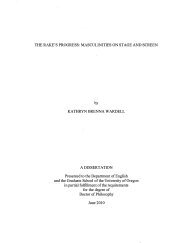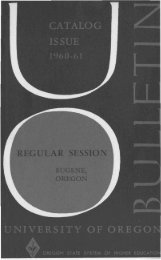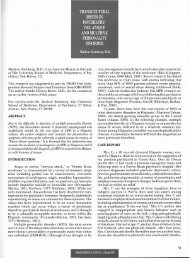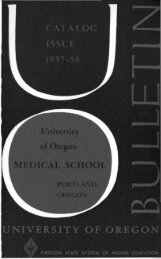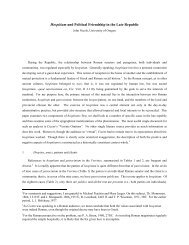~EGULAR SESSION - University of Oregon
~EGULAR SESSION - University of Oregon
~EGULAR SESSION - University of Oregon
Create successful ePaper yourself
Turn your PDF publications into a flip-book with our unique Google optimized e-Paper software.
330 PROFESSIONAL SCHOOLS<br />
Since the school owes its primary responsibility to the people <strong>of</strong> the state <strong>of</strong><br />
<strong>Oregon</strong>, special emphasis is placed on <strong>Oregon</strong> substantive law and on <strong>Oregon</strong><br />
procedure. Courses based upon the common law are organized to provide the<br />
student a thorough foundation in the fundamental principles <strong>of</strong> the common law<br />
and an understanding <strong>of</strong> the modification <strong>of</strong> these principles in <strong>Oregon</strong> by judicial<br />
decisions and statutes.<br />
In the list <strong>of</strong> courses on pages 331-335, elective courses are indicated with an<br />
asterisk (*). All other courses are required. The school reserves the right to make<br />
any desirable or necessary changes in courses as listed and described.<br />
The School <strong>of</strong> Law reserves the right to withhold recommendation for the<br />
granting <strong>of</strong> a degree to any student who, in the opinion <strong>of</strong> the faculty <strong>of</strong> the school,<br />
does not possess the character and abilities essential to the maintenance <strong>of</strong> the<br />
public trust in the legal pr<strong>of</strong>ession. Regular class attendance is required <strong>of</strong> students<br />
in the School <strong>of</strong> Law. Credit for any course may be denied for irregular<br />
attendance. Classes are regularly scheduled Monday through Saturday.<br />
An honor system, which has been in operation in the School <strong>of</strong> Law for more<br />
than thirty-five years, is applicable to all students in the school. The system is<br />
explained to first-year students at an assembly at the opening <strong>of</strong> the fall term <strong>of</strong><br />
each year.<br />
The requirements for the LL.B. and J.D. degrees are as follows:<br />
Bachelor <strong>of</strong> Laws. Students who have met the requirements for admission<br />
to the School <strong>of</strong> Law, and who have successfully completed courses in law aggregating<br />
123 hours and have otherwise satisfied the requirements <strong>of</strong> the <strong>University</strong><br />
and the School <strong>of</strong> Law, will be granted the degree <strong>of</strong> Bachelor <strong>of</strong> Laws (LL.B.).<br />
For the LL.B. degree the student must have a minimum grade-point average <strong>of</strong><br />
2.00 over the full three years <strong>of</strong> his work in the School <strong>of</strong> Law.<br />
Doctor <strong>of</strong> Jurisprudence. The degree <strong>of</strong> Doctor <strong>of</strong> Jurisprudence (J.D.) will<br />
be granted to students who, in addition to satisfying the requirements for an LL.B.<br />
degree:<br />
(l) Obtain (at least one year before completing work for the law degree)<br />
the Bachelor <strong>of</strong> Arts, Bachelor <strong>of</strong> Science, Bachelor <strong>of</strong> Business Administration,<br />
or an equivalent degree from this <strong>University</strong> or some other institution <strong>of</strong> recognized<br />
collegiate rank.<br />
(2) Earn a minimum grade-point average <strong>of</strong> 3.00 in the School <strong>of</strong> Law.<br />
(3) Complete 3 term hours in Thesis (L 503), involving the preparation,<br />
under the direction <strong>of</strong> the faculty <strong>of</strong> the School <strong>of</strong> Law, <strong>of</strong> a thesis or series <strong>of</strong><br />
legal writings <strong>of</strong> high merit.<br />
(4) Comply with such other requirements as the law faculty may from time<br />
to time impose.<br />
Transferred Credit. A student as a general rule may transfer not to exceed<br />
one year <strong>of</strong> credit earned in another law school <strong>of</strong> recognized standing, provided<br />
that, at the time he was admitted to the law school from which he wishes to transfer<br />
credit, he could have met the then-existing admission requirements <strong>of</strong> the<br />
<strong>University</strong> <strong>of</strong> <strong>Oregon</strong> School <strong>of</strong> Law. In exceptional cases only, a student may be<br />
permitted to transfer not to exceed two years <strong>of</strong> credit. The right to reject any<br />
and all such credit is reserved.<br />
Application for admission by a student who has attended another law school<br />
will not be considered unless: (1) the school from which transfer is sought is on<br />
the list <strong>of</strong> schools approved by the American Bar Association and is a member<br />
<strong>of</strong> the Association <strong>of</strong> American Law Schools; (2) the student is eligible for readmission<br />
in good standing to the school previously attended; and (3) the student's<br />
cumulative grade-point average for all pr<strong>of</strong>essional law courses completed<br />
is at least 2.00, when computed on the basis <strong>of</strong> the system <strong>of</strong> grade-point-average




